Have you ever wondered why some individuals weave elaborate tales while others value truth above all else? Psychology, the science of understanding human behavior, shines a spotlight on the intriguing world of liars. Delving into the psychology of liars unravels the intricate threads that connect motivation, emotion, and deception.
“A lie can travel halfway around the world while the truth is putting on its shoes.” – Mark Twain
What drives someone to fabricate stories, and what emotions lie beneath the surface? These questions hold the key to understanding our complex human nature.
Psychology offers us a lens to peer into the minds of liars, revealing a diverse array of motives. Whether it’s a simple “white lie” to avoid hurting feelings or a more complex fabrication, the motivations often revolve around self-preservation, fear, or the desire for acceptance.
These insights into the psychology of liars aren’t just fascinating—it’s a valuable tool in deciphering the intricacies of human interaction.
Why is it important to explore the psychology behind lying? Because it enhances our communication skills, empathy, and self-awareness. Consider a scenario where a close friend consistently exaggerates achievements.
Unraveling the psychology behind their behavior can lead to a more compassionate response. Instead of judgment, understanding their need for validation and recognition can transform your relationship.
Real-life example: Picture a colleague who bends the truth to appear more knowledgeable during office discussions. While this may initially seem harmless, understanding their motivation—perhaps a need to fit in or insecurity about their expertise—allows us to respond with empathy and encouragement, fostering a healthier work environment.
In conclusion, psychology is the compass guiding us through the labyrinth of human behavior. By unveiling the psychology of liars, we gain insight into their motives, emotions, and the impact of their actions. Armed with this knowledge, we can foster deeper connections, better understand our loved ones, and approach dishonesty with a blend of wisdom and empathy.
“The worst thing about being lied to is knowing you weren’t worth the truth.”
So, let’s embark on a journey of exploration, where the pages of psychology reveal the captivating story of why we sometimes choose to deceive, and how this insight can lead us to more authentic connections.
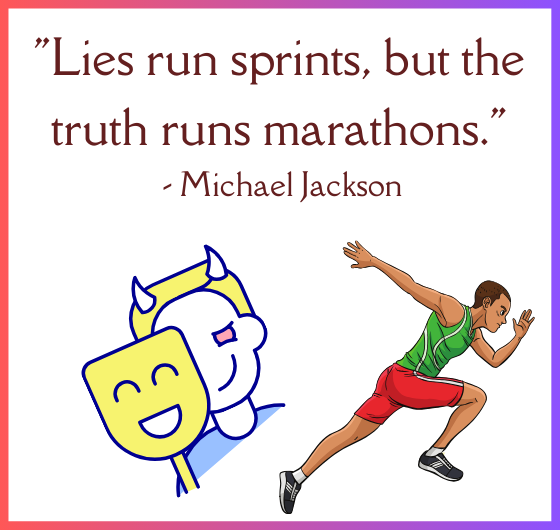
Do liars get worse with age?
As we journey through life, we often encounter the question: do liars become more adept at their craft with age? The fascinating world of psychology has much to say on this matter. While it’s not a universal truth, studies show that some individuals may indeed become more proficient at deception as they accumulate life experiences. This phenomenon is tied to the complex interplay between cognitive abilities and societal factors.
Understanding whether liars get worse with age is vital in our lives. It highlights the significance of cultivating honesty from a young age and nurturing a strong moral compass. As individuals grow older, their reasons for lying may evolve.
“Honesty is the first chapter in the book of wisdom.” – Thomas Jefferson
They might resort to deception to maintain an image, avoid conflicts, or safeguard their reputation. This emphasizes the importance of ethical education and open conversations within families and communities.
Real-life example: Imagine a senior employee who occasionally bends the truth to gain recognition at work. With time and experience, they might realize the importance of genuine achievements and authentic relationships. On the other hand, an individual who starts lying in their youth may find it harder to break free from the habit as they age.
In conclusion, whether liars worsen with age isn’t a straightforward answer, as individual factors vary. However, this topic underscores the significance of promoting honesty across generations.
By fostering open dialogues and instilling values of integrity from a young age, we can contribute to a society where authenticity is prized. So, let’s embark on a journey of exploration, embracing the complexities of human behavior and striving for a world where truthfulness knows no age limits.
Lying is an unnecessary loss of trust, while the truth is a chance to build it.”
Why do liars succeed?
“Why do liars succeed?” This question draws us into the intriguing world of deception and its hidden dynamics. Exploring this topic isn’t just about unraveling the tactics of dishonesty; it’s about understanding human behavior and its complexities. In a world where authenticity is valued, how do some individuals manage to weave intricate webs of lies that go undetected?
The answer lies in the art of manipulation and psychology. Liars often succeed due to their skillful manipulation of emotions, trust, and perception. These individuals possess the ability to read situations and adapt their falsehoods to match the expectations of their audience.
Importantly, understanding why liars succeed is crucial for navigating a world where trust is vital. Think about a job interview scenario. A candidate with excellent communication skills may fabricate parts of their experience to align with the job requirements, creating a facade of competence. Their success in landing the job hinges on their ability to deceive convincingly.
“Lying is done with words and also with silence.” – Adrienne Rich
Liars succeed when they exploit gaps in information or preconceived notions. They use these openings to their advantage, manipulating situations to fit their narratives.
Just like master storytellers, skilled liars craft tales that resonate with their audience, invoking empathy, sympathy, or admiration. In doing so, they blur the lines between fact and fiction.
But why is it important to delve into this topic? Because recognizing the tactics of successful liars equips us to be more discerning and cautious in our interactions. For instance, imagine encountering a charismatic salesperson who exaggerates the benefits of a product. Recognizing their tactics can empower you to make informed decisions and avoid falling for deceptive sales pitches.
A real-life example further illustrates the point. Consider a relationship where one partner habitually covers up their actions, making it difficult for the other to uncover the truth. This deceit, though successful for a time, erodes trust and tarnishes the foundation of the relationship. Such scenarios underscore the significance of understanding why liars succeed and how their tactics can impact our lives.
In conclusion, exploring why liars succeed is a journey into the depths of human behavior and psychology. By deciphering the tactics they employ, we gain insights that empower us to navigate a world where honesty and authenticity are prized. It’s a reminder that appearances can be deceiving, and the ability to discern truth from fiction is a valuable skill.
“A lie may take care of the present, but it has no future.”
Armed with this knowledge, we can engage with the world more mindfully, making choices that align with our values and fostering relationships built on trust and transparency. So, let’s embark on this exploration, unveiling the mechanisms behind successful deception and fortifying our understanding of human nature.
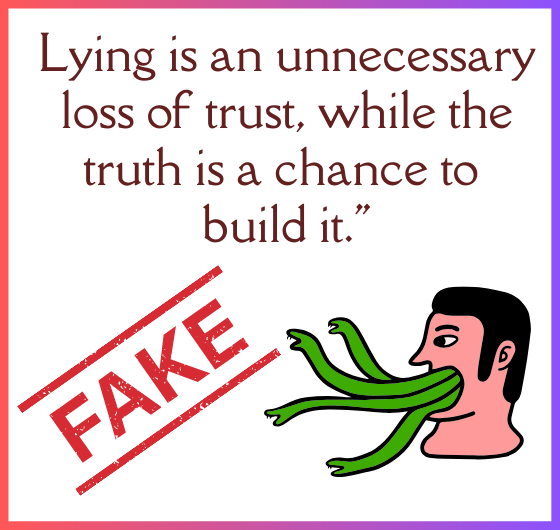
Who do liars target?
Have you ever wondered who bears the brunt of a liar’s deception? Delving into the question of “Who Do Liars Target?” reveals the intricate web of relationships, trust, and vulnerability. Just like skilled predators, liars often have a target in mind, someone they believe will be more receptive to their falsehoods. This topic isn’t just intriguing; it’s a window into the psychology of manipulation.
Liars often target those they perceive as gullible, naive, or empathetic. These individuals make for easy prey due to their openness and willingness to believe others.
Understanding the motives behind the selection of targets is crucial, as it highlights the importance of vigilance and critical thinking. Think about a scenario where a charming stranger approaches you with a sob story, seeking financial help. Their charismatic demeanor and emotive narrative might strike a chord, but your ability to recognize their intent can protect you from falling victim to a manipulative scheme.
Lies run sprints, but the truth runs marathons.” – Michael Jackson
Liars often target individuals who are trusting, empathetic, and sometimes, vulnerable. They recognize these qualities as opportunities to exploit.
Why is this topic relevant in our lives? Because recognizing the traits of vulnerable targets empowers us to guard against deception. Vulnerability isn’t a weakness; it’s a human trait that makes us compassionate and empathetic. However, it’s essential to be cautious when someone exploits these traits for their own gain.
Consider a real-life example: An elderly relative who receives unsolicited phone calls promising unrealistic rewards in exchange for personal information. Their trusting nature makes them susceptible to these scams. Understanding that liars often target the vulnerable prompts us to educate our loved ones about potential pitfalls and equip them to make informed decisions.
In conclusion, exploring who liars target is a dive into the psychology of manipulation and trust. By understanding the characteristics that make certain individuals susceptible to deception, we can shield ourselves and our loved ones from falling prey to manipulative tactics. It’s a reminder to approach interactions with a healthy dose of skepticism, while still maintaining our empathy and compassion.
Armed with this knowledge, we can foster a community that supports one another in staying vigilant and resilient against the deceptive tactics of those who would seek to exploit us. So, let’s delve into the world of targets and manipulation, emerging with a deeper awareness of the factors at play and a commitment to protecting ourselves and our loved ones from the snares of deception.
Why liars are toxic?
“Why Liars Are Toxic?” This question opens the door to a crucial exploration of the effects of deception on our lives and relationships. Understanding why liars can be toxic isn’t just about avoiding negative influences; it’s about safeguarding our emotional well-being and nurturing authentic connections.
“The truth may hurt for a little while, but a lie hurts forever.”
Liars are toxic because their falsehoods erode trust, the foundation of any healthy relationship.
Importantly, recognizing the toxic nature of liars is vital for maintaining our mental and emotional health. Consider a friendship where one person consistently fabricates stories to gain attention. The initial intrigue fades as the web of lies unravels, leaving a trail of broken trust and emotional turmoil.
Liars are also toxic because they manipulate emotions for their gain. They often play with feelings, using false information to create drama or gain sympathy. Think about a co-worker who constantly exaggerates challenges to gain sympathy from colleagues. Their manipulation not only affects team dynamics but also casts a cloud of suspicion on genuine struggles.
Moreover, liars can be toxic because they contribute to a culture of dishonesty. When one person engages in deception, it often sets off a chain reaction. Imagine a family where one member consistently lies to avoid confrontation. This behavior might encourage others to follow suit, leading to a breakdown in open communication and trust.
Why is this topic important? Because recognizing the toxicity of liars empowers us to set healthy boundaries and make informed choices in our relationships. By understanding the detrimental impact of deception, we can distance ourselves from those who engage in manipulative behavior.
A real-life example further highlights this point. Imagine a romantic relationship where one partner continuously hides their actions, leading to constant suspicion and arguments. The toxic atmosphere created by the deceit erodes the bond between them, making it difficult for the relationship to thrive.
In conclusion, exploring why liars are toxic sheds light on the insidious effects of deception on our lives. By recognizing the damage caused by their falsehoods, we can make conscious choices to distance ourselves from toxic individuals. It’s a reminder that authenticity and trust are essential ingredients for healthy relationships.
Armed with this knowledge, we can navigate our social circles with discernment, nurturing connections built on transparency and mutual respect. So, let’s embark on this journey of understanding, freeing ourselves from the toxic influence of deception and fostering relationships that enrich our lives with positivity and trust.
“Lying is like a snowball; it gets bigger and bigger.” – Martin Luther King Jr
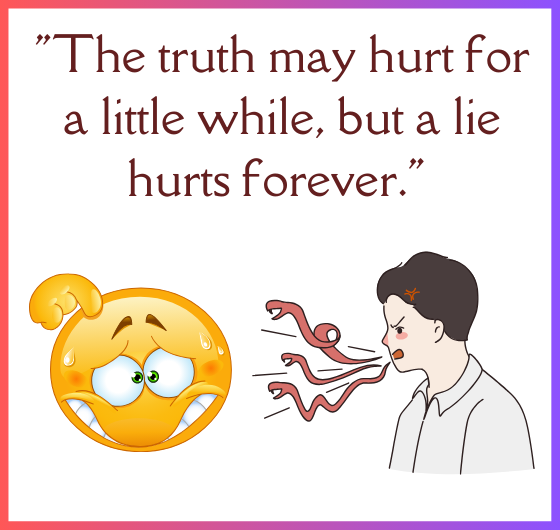
How does lying affect the brain?
“How Does Lying Affect the Brain?” This inquiry leads us into the fascinating realm of neuroscience and human behavior. Understanding the impact of lying on the brain isn’t just about unraveling scientific mysteries; it’s about comprehending the intricate dance between our actions and our cognitive processes.
When we lie, our brain engages in a complex ballet of emotions, cognitive functions, and ethical considerations.
The importance of comprehending how lying affects the brain lies in its implications for our moral compass. Imagine a scenario where a student cheats on an exam. As the brain rationalizes the act, it triggers a cascade of emotions, from guilt to anxiety. This emotional turmoil speaks to the intricate connection between our actions and our psychological well-being.
Honesty is more than not lying. It is truth telling, truth speaking, truth living, and truth loving.” – James E. Faust
Lying affects the brain by triggering the release of stress hormones like cortisol. This response is similar to the “fight or flight” reaction, signaling that dishonesty carries a psychological toll. Consider the case of someone who fabricates a story to impress their peers. The initial thrill is quickly overshadowed by the stress of maintaining the deception.
Moreover, lying can lead to a phenomenon known as cognitive dissonance, where the brain experiences discomfort due to conflicting beliefs and actions. This mental discord compels us to resolve the inconsistency by either altering our beliefs or changing our actions. For instance, consider a person who lies about their commitment to a project. As they continue the charade, the dissonance between their words and actions grows, leading to internal tension.
Why is this understanding important? Because it empowers us to make conscious choices that align with our values. Recognizing the toll that lying takes on the brain can prompt us to prioritize honesty, not just for ethical reasons, but also for our mental and emotional well-being.
A real-life example further illustrates this point. Imagine a close friend who regularly tells small lies to avoid confrontations. Over time, their dishonesty chips away at the trust in your relationship, leading to strained interactions and emotional distance. The impact of their lies on both their brain and their emotional state becomes evident.
In conclusion, exploring how lying affects the brain is a journey into the intricate workings of our minds. By understanding the emotional toll, stress responses, and cognitive dissonance associated with deception, we gain insights that can guide our choices and behaviors. It’s a reminder that our actions reverberate within our own minds, influencing our well-being and relationships.
Armed with this knowledge, we can approach our decisions with heightened self-awareness, fostering a sense of authenticity that resonates both within us and in our connections with others. So, let’s embark on this exploration, unraveling the mysteries of how our brains respond to dishonesty, and using this insight to shape a more truthful and harmonious existence.
“If you tell the truth, you don’t have to remember anything.” – Mark Twain
What are the 3 effects of lying?
“What Are 3 Effects of Lying?” This query invites us to explore the intricate web of consequences woven by deception. Understanding the effects of lying isn’t just about unraveling the aftermath of dishonesty; it’s about recognizing the impact on our relationships, mental well-being, and the very fabric of trust that binds us.
Firstly, lying corrodes trust. Imagine a scenario where a friend repeatedly embellishes stories. As their falsehoods accumulate, trust erodes, and the foundation of the relationship crumbles.
Secondly, lying fosters guilt and anxiety. When we’re untruthful, our conscience often bears the weight of our actions. A real-life example brings this effect to light. Imagine a teenager who fabricates excuses to avoid household chores. Over time, their deception spawns guilt and unease, impacting their emotional well-being and self-esteem.
“Lies run sprints, but the truth runs marathons.” – Michael Jackson
Lastly, lying strains mental health. Concealing the truth triggers stress responses in the brain, releasing hormones like cortisol. This physiological reaction is similar to the “fight or flight” response, illustrating the toll that dishonesty takes on our well-being. Think about an employee who exaggerates achievements to impress their boss. The initial thrill soon gives way to the burden of maintaining the charade, contributing to increased stress and mental strain.
Why is understanding these effects crucial? Because it equips us to make informed choices that align with our values and well-being. Recognizing the impact on trust, guilt, and mental health encourages us to value honesty as a cornerstone of healthy relationships and personal growth.
In conclusion, exploring the effects of lying unveils the intricate threads that connect dishonesty to our lives. By understanding how deception corrodes trust, fosters guilt, and strains mental health, we can navigate our interactions with heightened awareness. It’s a reminder that our actions carry reverberations beyond the surface, influencing our relationships and our internal landscapes.
Armed with this knowledge, we can foster connections built on transparency and authenticity, nurturing a healthier emotional state and a more harmonious social tapestry. So, let’s embark on this exploration, peeling back the layers of deceit’s consequences and weaving a narrative that celebrates the power of truth and its enduring impact.
“What Is the Main Reason Why Lying Is Important?” This query delves into the layers of human interaction and the nuances of truth and deception. Understanding the importance of lying isn’t just about unraveling its complexities; it’s about recognizing how it serves as a social lubricant, allowing us to navigate the delicate balance between honesty and diplomacy.
The main reason why lying is essential lies in its role as a tool for maintaining harmony and avoiding conflict. Consider a scenario where a colleague presents an idea you disagree with. Instead of bluntly dismissing it, you might choose to offer a tactful response to prevent hurt feelings and maintain a positive atmosphere.
Importantly, understanding this reason sheds light on the delicate art of communication. Imagine a family gathering where a relative presents a gift you don’t particularly like. Rather than expressing your true feelings and potentially causing discomfort, you might opt for a gracious response, prioritizing the emotional well-being of both parties.
Moreover, lying can be a shield to protect our vulnerabilities. By selectively revealing information, we exercise control over what others perceive. Think about a person who downplays their struggles to appear resilient. While this untruth may seem superficial, it allows them to maintain a sense of strength in the face of adversity.
“A half-truth is a whole lie.” – Yiddish Proverb
Why is grasping this concept essential? Because it equips us with the tools to navigate the complexities of human interaction. Recognizing the role of lying in diplomacy and social harmony empowers us to communicate effectively and foster positive connections. It’s a reminder that while honesty is a virtue, there are instances where a well-timed untruth can preserve relationships and prevent unnecessary discord.
A real-life example further illustrates this point. Imagine a situation where a friend asks your opinion about their new hairstyle. If you genuinely dislike it, choosing to emphasize the aspects you do appreciate demonstrates the importance of diplomacy and empathy in maintaining the friendship.
In conclusion, delving into the main reason why lying is important reveals the intricate dance between honesty and diplomacy. By recognizing its role in social cohesion, conflict avoidance, and vulnerability protection, we gain insights that enrich our interactions. It’s a reminder that effective communication requires nuance and sensitivity and that sometimes, a small untruth can contribute to the greater good.
Armed with this knowledge, we can approach our conversations with heightened awareness, choosing our words thoughtfully to build bridges rather than barriers. So, let’s embark on this exploration, unraveling the significance of lying as a tool for maintaining social harmony and fostering connections that are built on authenticity and consideration.
“The worst thing about being lied to is knowing you weren’t worth the truth.”
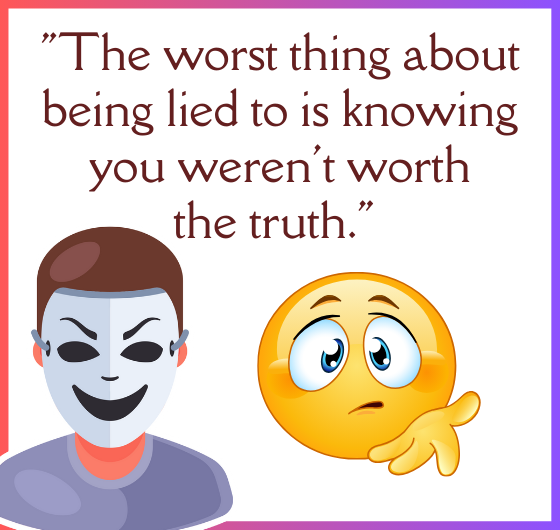
25 reasons explaining how lying can potentially make you stronger for the future:
1.. Resilience Training: Navigating the consequences of lying can develop your ability to bounce back from setbacks.
2. Problem-Solving Skills: Dealing with the aftermath of dishonesty hones your strategic thinking and creative solutions.
3. Emotional Intelligence: Recognizing the emotions tied to lying enhances your understanding of human behavior.
4. Adaptability: Addressing the fallout of lies fosters adaptability in changing circumstances.
5. Critical Thinking: Evaluating the outcomes of deception sharpens your analytical skills.
6. Communication Mastery: Managing the aftermath of lying can improve your communication finesse.
7. Ethical Reflection: Lying prompts ethical introspection, strengthening your moral compass.
8. Decision-Making: Weighing the consequences of dishonesty improves your decision-making prowess.
9. Conflict Resolution: Handling conflicts arising from lies hones your conflict-resolution skills.
10. Self-Reflection: Confronting the reasons behind lying nurtures self-awareness.
11. Perspective Shift: Dealing with repercussions encourages seeing situations from different angles.
12. Self-Control: Managing guilt or anxiety from lying cultivates emotional self-regulation.
13. Empathy Development: Realizing the impact of lies on others fosters empathy.
14. Leadership Traits: Handling the outcomes of deceit can instill leadership qualities.
15. Patience: Dealing with the consequences of lies nurtures patience over time.
16. Moral Compass: Reflecting on lying aids in strengthening your ethical foundation.
17. Problem Anticipation: Understanding potential consequences improves foresight.
18. Stress Management: Coping with the aftermath builds stress-resilience skills.
19. Interpersonal Insight: Navigating relationships post-deception enhances social awareness.
20. Humility: Acknowledging mistakes in lying cultivates humility.
21. Learning from Failure: Consequences provide valuable lessons for future honesty.
22. Goal Orientation: Focusing on repair or redemption demonstrates determination.
23. Growth Mindset: Viewing lies as opportunities for growth fosters resilience.
24. Boundaries Setting: Addressing the impact helps establish more precise personal boundaries.
25. Future Honesty: Learning from lying can guide you towards a more truthful future.
Exploring how lying can ultimately contribute to personal growth and strength is an intriguing angle to examine the complex interplay between our actions, emotions, and self-development.
“No legacy is so rich as honesty.” – William Shakespeare
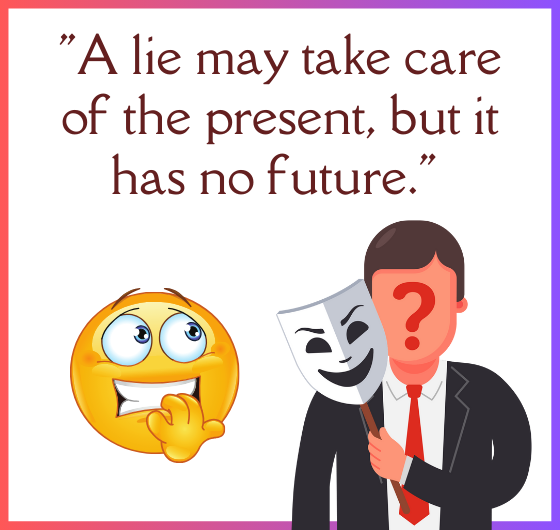
Story :
The Sage’s Lesson: How Lying Can Make You Stronger for the Future
In a serene village nestled amidst the Indian hills, lived a wise old sadhu named Guru Amar. His reputation for imparting life’s profound lessons drew seekers from far and wide. Among his devoted disciples was young Ravi, eager to learn the secrets of a meaningful life.
One day, as the sun painted the sky with hues of orange and pink, Guru Amar gathered his disciples under the ancient banyan tree. He spoke of the unexpected strength that could arise from facing the consequences of dishonesty. As intrigued eyes looked upon him, Guru Amar began to weave a tale that left an indelible mark on their hearts.
He narrated the story of a humble farmer named Raju who once chose to lie about his crop yield to impress the villagers. The lie snowballed into an elaborate facade, leading Raju to dig himself into a web of deceit. “You see,” the sage explained, “Raju believed that lying was a shortcut to admiration. But he soon realized that the weight of falsehood was dragging him down.”
Guru Amar’s piercing gaze shifted to Ravi, sensing the resonance within him. With gentle empathy, he continued, “Now, young Ravi, imagine the strength Raju could have gained if he had faced the truth head-on. By embracing the consequences and rectifying his actions, he would have cultivated inner resilience.”
As the days passed, Guru Amar continued to illustrate the concept with real-life examples. He recounted the tale of a young merchant, Priya, who had manipulated her customers to earn a quick profit. The happiness she sought in riches faded, replaced by an overwhelming guilt that gnawed at her soul. “Priya’s story teaches us,” the sage shared, “that the pursuit of integrity paves the path to lasting inner strength.”
One evening, as the moon illuminated the ashram, Guru Amar called Ravi to his side. “My dear disciple,” he began, “just as a tree grows stronger when it withstands the storm, a person becomes resilient when they face the consequences of their actions. Lying might provide temporary relief, but the burden it carries weakens the spirit.”
Ravi listened with a newfound understanding, realizing that Guru Amar’s teachings were not merely theoretical but deeply rooted in life’s complexities. The sage’s stories illuminated the profound truth that facing the aftermath of dishonesty was akin to a crucible, forging strength and wisdom.
Months turned into years, and Ravi imbibed the lessons of his beloved Guru. He understood that embracing the repercussions of one’s actions, however difficult, was the path to fortitude. Ravi recalled Raju and Priya’s stories, finding solace in their journey from deceit to redemption.
As time flowed, Ravi emerged not only as a disciple but a beacon of inspiration. His strength of character and unwavering commitment to truthfulness resonated with all who crossed his path. And so, the village echoed with tales of Ravi’s transformation, a testament to the sage’s wisdom.
In the heart of that Indian village, the story of Guru Amar and Ravi became a cherished legend. It reminded everyone that honesty, even when difficult, was the forge upon which inner strength was honed, and as the banyan tree continued to witness countless sunrises and sunsets, its shade remained a place of solace where stories of truth and strength were shared for generations to come.
“Lies will always be bitter in the end, no matter how sweet you made them at the beginning.”

